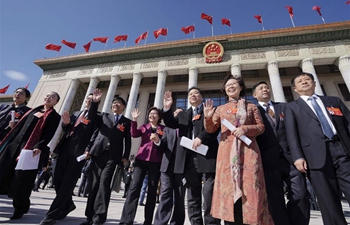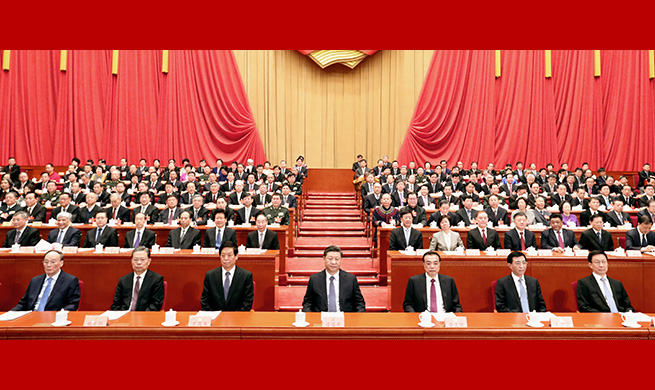TOKYO, March 14 (Xinhua) -- Japanese ruling and opposition party lawmakers agreed on a joint bill Thuresday to compensate each surviving victim of forced sterilization under Japan's past eugenics law 3.2 million yen (28,700 U.S. dollars).
The bill, to be submitted to the Diet and come into effect in April, mandates that the surviving victims will receive a single payment from the state and a "deep apology."
The bill begins with an introduction that states: "We sincerely reflect on and deeply apologize for the great physical and mental suffering that was inflicted."
But the statement has been criticized by plaintiffs, victims and legal entities representing them, as there is no incontrovertible mention of the state and its culpability.
Along with the amount of compensation being criticized as being low by lawyers involved in seeking damages for surviving victims across the nation, the victims themselves believe that the "deep apology" does not clearly reference the state's specific culpability as the bill's preamble avoids using the word "state" or "government" despite the mention of "we."
Ruling Liberal Democratic Party lawmaker Norihisa Tamura, head of the task force involved with crafting the bill, maintained that, "The word 'we' strongly signals that it includes the Diet and the government."
Many of the victims feel that the government merely "signaling" its involvement diminishes the sincerity and credibility of its pseudo-apology.
Since the bill was finalized between Japan's ruling and opposition parties, the amount of compensation has been increased from 3 million yen (26,800 U.S. dollars) as stated on March 1, to the current 3.2 million yen (28,700 U.S. dollars).
But prior to the lawmakers agreeing to redress the victims, a number of lawsuits have already been filed, with the highest demand for compensation topping 35 million yen (313,500 U.S. dollars).
The lawsuits filed against the government include those seeking compensation for claims that they were forcibly sterilized or forced to have abortions under the nation's former eugenics protection law.
The plaintiffs in the suits have claimed that being sterilized against their will or without their consent runs contrary to their onstitutional rights and the Japanese government has since provided absolutely no requital or support in any way.
The number of plaintiffs in sterilization lawsuits has been steadily rising, with the victims claiming that being forcibly sterilized under the eugenics law deprived them of their constitutional right, in some cases, to choose whether or not to have children.
The highly controversial law, similar to Nazi Germany's sterilization law and enacted in 1948 as a population control measure to deal with Japan's postwar food shortage, made it possible for the state to sterilize thousands of people without then giving their consent, due to mental disabilities and other illnesses.
According to the Ministry of Health, Labor and Welfare and the Japan Federation of Bar Associations, up until the contentious eugenics law was removed in 1996, a total of 25,000 people were sterilized, 16,500 of them were sterilized without them giving their prior consent.
Despite the current legislative plans to pay reparations, the Japanese government has maintained that the sterilizations conducted under the eugenics law at the time were legal and as such it was not "obliged" to pay compensation to the victims of its much-maligned sterilization program.
A local court responsible for adjudicating in one high-profile case of forced sterilization found that it was possible that Japan's eugenics law was, indeed, constitutionally unsound.
This may account for the government's about-turn on the sensitive issue, experts on the issue have said, while calling on the government to meet the victims' wishes of fully admitting its culpability.
The bill has also been criticized for not recognizing the spouses of victims who have passed away as eligible for receiving any redress.
A ministry official saying there is no clear time frame for the payments to the victims to be made, also drew flak from lawyers and plaintiffs who again maintained the government's attitude toward its redress seemed wholly insincere.













